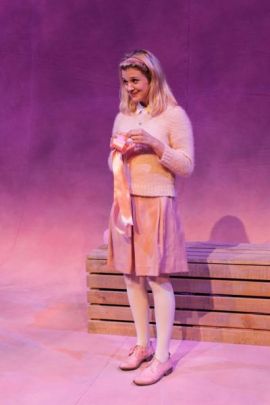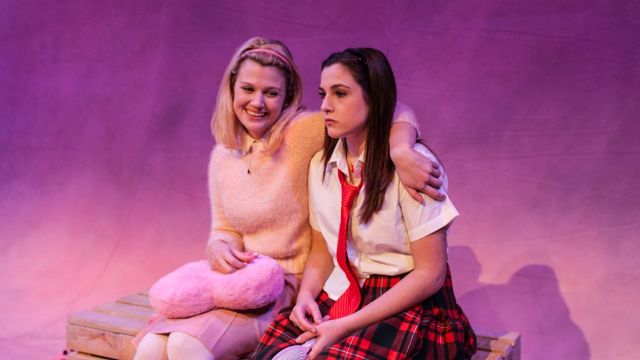Jesikah
She is narcissistic, self-obsessed, manipulative. In an effort to gather around her the admiration and attention of 'friends', she may well be alienating - or worse - the only true allies currently in her life.
She is Jesikah, and she stands at the centre of the new State Theatre production that bears her name, a show that has been specially commissioned for the 2014 Education Program - aimed at secondary students - incorporating a school-targeted tour of outer-metro and regional areas in South Australia.
Demonstrating her interests and enthusiasms for both a theoretical internet audience and an actual theatre audience, her webcam image projected larger-than-life in 'real time', our teenage protagonist wants us to be engaged by her story and sympathetic to her situation. We are - up to a point.
 Attempting to succeed as both an issue piece and a character study, as both comedy and drama, Jesikah tends to suffer slight shortfalls when measured up to each of these yardsticks. To be sure, there are times when the mixture of tone is successfully balanced and comes across as gratifyingly complex, with playwright Phillip Kavanagh and director Nescha Jelk managing to locate those universal moments when absurdity threatens to bring on laughter as the best medicine to fight the seeming inevitability of tears.
Attempting to succeed as both an issue piece and a character study, as both comedy and drama, Jesikah tends to suffer slight shortfalls when measured up to each of these yardsticks. To be sure, there are times when the mixture of tone is successfully balanced and comes across as gratifyingly complex, with playwright Phillip Kavanagh and director Nescha Jelk managing to locate those universal moments when absurdity threatens to bring on laughter as the best medicine to fight the seeming inevitability of tears.
Jelk professes in the programme notes that both she and Kavanagh are fascinated "by the human fear of being insignificant". This would be a juicy theme, well worth exploring - but perhaps a length of 90-120 minutes, rather than 60 or so, would be more conducive to a truly successful show on the subject. In any event, there is not quite enough sense conveyed as to the vulnerability of young Jesikah, supposedly lurking behind a façade of self-confidence and outer toughness.
The technical choices made by Nescha Jelk and her production team in the staging of Jesikah are successful on their own terms. Olivia Zanchetta's stage design is simple and effective, with the contributions provided by Ben Flett's lighting and Will Spartalis' sound remaining mostly unobtrusive (excepting a curious and seemingly unnecessary sequence where different locations are 'intercut' swiftly back-and-forth, but without making any discernable dramatic point).
Out of the two performers in the cast, both of whom remain on stage continuously with no costume changes, Elizabeth Hay is the one given the greatest opportunity to display versatility and nuance in her three roles of best friend Denise, drama teacher Miss H, and supportive Mum. It is to be hoped that her first time performing with State Theatre is followed by many more opportunities.
 Kate Cheel has drawn on a fairly safe set of verbal and physical mannerisms with which to embody the teenage Jesikah. It is a theatrical performance of superficial strength and magnetism without a great deal of depth on display, which is perhaps appropriate for the character in question, but which makes an hour in Jesikah's company seem ultimately of questionable worth, particularly when she appears to have learnt little from her experiences by the time the bitter end rolls around.
Kate Cheel has drawn on a fairly safe set of verbal and physical mannerisms with which to embody the teenage Jesikah. It is a theatrical performance of superficial strength and magnetism without a great deal of depth on display, which is perhaps appropriate for the character in question, but which makes an hour in Jesikah's company seem ultimately of questionable worth, particularly when she appears to have learnt little from her experiences by the time the bitter end rolls around.
One doesn't necessarily desire a return to the clear-cut, simplistic morality of an era long gone, but there is a lingering feeling that an opportunity to create a thoroughly useful and interesting piece of theatre has been somewhat lost here.
And yet - one cannot deny that the impact of this show does linger in the way that it almost certainly was intended to. Whether Jesikah has truly earned the right, over the previous hour, to end on such a palpably haunting note is open for debate.
Anthony Vawser
Images (from top): Elizabeth Hay and Kate Cheel, Elizabeth Hay & Kate Cheel. Photographer: Sia Duff.
Subscribe to our E-Newsletter, buy our latest print edition or find a Performing Arts book at Book Nook.

